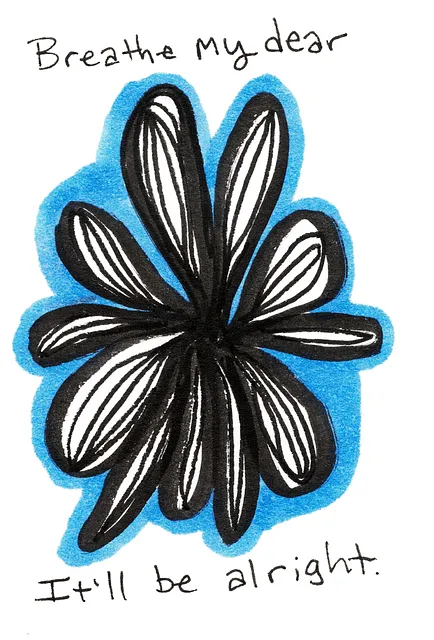Mental wellness journaling is a powerful tool for self-reflection and personal growth, as evidenced by research from Kaiser's Aurora therapists. It aids in stress management, cultivating self-awareness, and replacing negative beliefs with positive perspectives. Creating an inspiring home space and maintaining consistency are key. Journaling offers versatile techniques tailored to individual needs, promoting emotional release and coping skills. In Aurora, where Kaiser has renowned therapists, it facilitates understanding of healthcare experiences, triggers, and coping strategies, enhancing therapy outcomes. Regular journaling tracks progress, reveals patterns, and aids in identifying effective coping skills, especially when considering good therapists from Kaiser.
Unwind your mind and embrace the transformative power of mental wellness journaling with our comprehensive guide. Discover how this simple yet effective practice can enhance your well-being, offering a safe space to reflect and grow. From understanding its profound benefits to setting up a personalized routine, we’ll navigate you through the process. Explore diverse journaling techniques, learn to interpret thoughts and emotions, and track progress like a seasoned therapist—all without needing an appointment with Kaiser’s professionals in Aurora.
- Understanding Mental Wellness Journaling Benefits
- Setting Up Your Journaling Space and Routine
- Exploring Different Journaling Techniques
- Reflecting on Thoughts and Emotions
- Tracking Progress and Identifying Patterns
Understanding Mental Wellness Journaling Benefits

Mental wellness journaling is a powerful tool for self-reflection and personal growth. By dedicating time to record thoughts, emotions, and experiences, individuals can gain valuable insights into their mental health. This practice offers a safe and private space to explore feelings, track progress, and identify patterns, which are all essential aspects of managing and improving overall well-being. It’s an effective way to process daily stressors, cultivate self-awareness, and develop coping mechanisms, especially for those seeking anxiety relief or trauma support services.
For instance, a study by Kaiser (a prominent healthcare organization) found that therapists in Aurora have successfully integrated journaling exercises into therapy sessions, leading to improved patient outcomes. This simple yet profound practice encourages individuals to confront their thoughts, challenge negative beliefs, and replace them with more positive, realistic perspectives. Additionally, regular journaling can enhance stress management skills, making it a valuable resource for anyone looking to navigate life’s challenges with greater resilience and emotional balance.
Setting Up Your Journaling Space and Routine

Creating a dedicated journaling space is an excellent first step to establishing a consistent routine. Consider a quiet area in your home where you can retreat, free from distractions. A comfortable chair and a well-lit table are essential; ensure your workspace reflects your personality and inspires calmness. You might want to add personal touches like plants or meaningful artwork to make it a sanctuary for self-reflection.
Consistency is key when developing a journaling practice. Aim for a regular schedule, perhaps every morning or before bed, to cultivate a sense of routine. Begin with small, manageable goals, such as writing for just 10 minutes daily. Over time, this can become a powerful tool for managing stress and cultivating positive thinking. Remember, there’s no one-size-fits-all approach; customize your journaling experience to support your unique mental wellness journey, especially when exploring ways to overcome mental illness stigma reduction efforts.
Exploring Different Journaling Techniques

Journaling is a versatile tool that can be tailored to individual needs and preferences. When it comes to exploring different techniques for mental wellness journaling, there’s an array of options available. Some people find comfort in stream-of-consciousness writing, where thoughts flow freely onto the page, fostering self-reflection and emotional release. Others prefer structured formats like prompts or guided meditations that encourage specific reflections on gratitude, challenges faced, or coping skills developed.
In Aurora, where Kaiser has renowned therapists, mental health awareness is increasingly prioritized. Journaling exercises can play a pivotal role in this context, offering spaces for individuals to develop empathy building strategies and enhance their overall well-being. By experimenting with various journaling techniques, one can unlock personalized practices that support not just coping skills development but also foster deeper self-understanding and resilience.
Reflecting on Thoughts and Emotions

Journaling is a powerful tool for self-reflection, especially when it comes to understanding our thoughts and emotions. By dedicating time each day or week to write about our experiences, we can gain valuable insights into our mental wellness. This practice allows us to explore and reflect on the fluctuations of our moods, fears, and aspirations—a process that can be immensely therapeutic.
For instance, when individuals consider their interactions with healthcare providers, such as those at Kaiser in Aurora, they might uncover underlying concerns or patterns. Journaling prompts like “What emotions did I experience during my last therapy session?” or “How do I cope with stress and anxiety?” encourage introspection. Through this practice, one can identify triggers, develop strategies for inner strength development, and even advocate for better mental health policies based on their personal experiences (Mental Health Policy Analysis and Advocacy). Additionally, it fosters cultural competency among healthcare providers by helping them understand the unique perspectives and needs of their patients.
Tracking Progress and Identifying Patterns

As you consistently engage in mental wellness journaling, tracking your progress becomes a powerful tool for self-awareness. Reviewing your entries over time allows you to identify patterns and trends in your emotional state and behaviors. This process helps you recognize triggers that may be negatively impacting your mental health. For instance, if you notice increased anxiety levels during specific weeks or after certain events, this knowledge can guide you towards developing effective coping skills.
In the context of finding good therapists in Aurora (a region often associated with Kaiser’s healthcare services), journaling can aid in identifying what works best for you. By documenting your experiences and outcomes from different therapeutic approaches, you may uncover preferences that lead to more successful treatment. Additionally, this practice fosters empathy building strategies, enabling you to better understand and manage your mental wellness journey.
Mental wellness journaling is a powerful tool for self-discovery and growth, offering numerous benefits such as improved emotional regulation, increased self-awareness, and enhanced coping mechanisms. By setting up a dedicated space and establishing a routine, you can unlock the therapeutic potential of this practice. Experimenting with various techniques allows for personalized exploration of thoughts and emotions, while tracking progress reveals valuable patterns and triggers. Remember, finding the right approach is key, and resources like Kaiser’s network of therapists in Aurora can provide additional support when needed. Embrace the transformative power of journaling to nurture your mental wellness journey.






